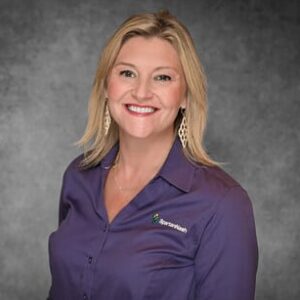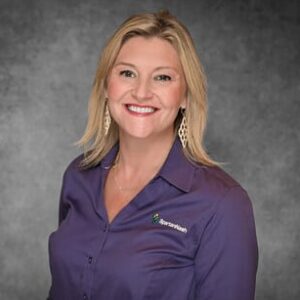Turnover is a chief concern for most HR leaders today. Food solutions company SpartanNash, which employs 17,000 associates across its food wholesale and grocery retail sectors, reduced turnover by 12% in the last year—thanks to several innovative approaches that exemplify its people-first culture.
From an overhaul of total rewards to a focus on DE&I and an investment in data-driven people insights, tackling turnover required an end-to-end evaluation of talent practices, says Nicole Zube, executive vice president, CHRO of SpartanNash. Another chief contributor to the company’s success in reducing turnover, Zube says, is the creation of its People Philosophy and Competencies, which have been embedded throughout the talent process—from recruiting and hiring to career and leadership development.
Zube, who joined the company in 2022 after two decades in HR—including stints at Kellogg Co. and Procter & Gamble, recently shared with HRE the work that went into reducing turnover at SpartanNash. Such efforts have also been pivotal to helping the company win recent recognition, like the Great Place to Work® certification and spots on Newsweek’s America’s Greatest Workplaces for Diversity and Indeed.com’s Top 25 Most Flexible Companies lists.
HRE: How is SpartanNash thinking about workforce skills?

Zube: We’re focused very heavily on skills. We also focus on the core behaviors we expect our associates to demonstrate every single day and link those to skills. We have four core behaviors: We serve, we create solutions, we win and we have fun.
We know it’s important to inspire people, and so we have a tagline that we live every day called “careers for a better life.” We want our people to believe that they can grow within the company and give them reasons to believe, regardless of their starting point—whether you start in a retail store or you’re in a leadership role here—that you can continue to grow your skills and have a really robust career.
Our organization is a little bit different in that about 90% of our associates are frontline workers. So, they need to have really great day-to-day skills to delight our customers. To hone that further, we have what we call our SpartanNash University, which is our internal leadership development program. One of the other programs we have is I GROW. As people grow, it’s not just about technical skills; you always need to be developing your leadership skills. The I GROW program really helps you grow those and also get the breadth across all the different departments we have to learn how to take your skills and potentially apply them to a different area.
HRE: How does the company’s people-first approach show up in employees’ day-to-day work?
Zube: For us, “people-first” is the cornerstone of every single thing that we do. What I love about being a people-first company is that it’s not just words on a page; we really live it every single day in our actions. We make decisions that help people on a large scale, not just at an individual level.
We do a lot to recognize associates on a regular basis. We have various rewards programs. We make sure that our folks have competitive pay and flexible benefits. With our total rewards offerings, we have different medical plans, paid time off even for folks who are part-time, paid parental leave. We think holistically about the total rewards offerings that we’re giving to our associates.
And we have a really great communications team and a great culture that help our associates understand how they each individually play into our winning recipe. We continue to raise the bar with ongoing culture-building events to create positivity and fun in the company. We have events like Talk Like a Pirate Day, we do Halloween events where families can come on-site and do trick-or-treating, we just had a big Cinco de Mayo party.
One “goosebump-worthy” thing we do every year is our Circle of Excellence event that we have in Florida, where we take our top-performing hourly associates and we roll out a green carpet—because we are a green company—and they walk down and we cheer them by name and thank them for all they’ve done to contribute to our company. For most of those folks, it’s the first time in their lives they’ve ever received some sort of company-wide recognition and for some of them, it’s even their first flight they’ve ever taken. It’s just a really nice way that we show our heartfelt appreciation for all that they do every single day.
HRE: How have such efforts helped Spartan Nash reduce turnover?
Zube: For one, we’re continuing to invest in our people, making sure that they feel valued for the work they do every day through their compensation and total rewards. We also introduced competencies into our company that link back to skills. We took those competencies and embedded them into our interview process so that we’re selecting better talent in the organization. We also are doing some realistic job previews. Before people join us, they can understand, what am I actually going to be expected to do? What is the work environment going to be?
Another area has been diversity, equity, inclusion and belonging—making sure that everybody in our organization knows it’s their responsibility to make people feel welcome from the first day that they’re here. We believe retention is truly everyone’s job. Our associate resource groups that focus on common interests, backgrounds and experiences really help with that.
Finally, we believe that what gets measured gets done, so we have goals for retention in every single department and facility we have here at SpartanNash. We’ve done some analysis, and we found out that somebody who stays with us for 90 days is four times more likely to stay with us for a year. And among those that make it to the year, we only have a turnover rate of about 4%. We continue to host stay interviews and make sure that people feel engaged from their first day here. But we really focus and hone in on those first 90 days.
Click here to read more Insights from a CHRO.
HRE: What is the most significant external factor challenging your team’s work?
Zube: A lot has changed post-COVID, and a lot of that has been related to being able to work from home. But a large majority of our associates don’t have that sort of flexibility because they need to be behind a cash register or driving a truck. So, that’s a significant external factor influencing our workplace dynamics.
We have made it a priority here to make sure that we show up for each other in person and be there to support our frontline associates. We keep focused on cultivating an environment where associates can do their best work when they’re here. And we understand that having a great work/life balance is really important to do so. We make sure that people have scheduled flexibility. We have flexible paid time off, and we’ve been recognized as being one of the top 25 most flexible companies to work for from Indeed.com. We’ve really upped our game as it relates to flexibility and are continuing to evolve post-COVID.
HRE: Speaking of evolving, how would you say your approach to HR leadership has evolved throughout your career?
Zube: I think individual leadership is always evolving. But I know I’ve evolved personally quite a bit in my over 20 years of being in human resources. I think the CHRO role and human resources functions are changing a lot, and it’s largely due to a lot of the social issues that have been happening in the world. It’s critical for us in HR to be experts in many areas; we have to have the skills of a generalist to be able to flex on what’s going on across the business. We have to keep up with trends that are going on and what’s happening in the broader market to have that true kind of global perspective. We also focus really heavily on continuing to learn and evolve. I just recently switched into this industry, and it’s been really nice to take what I’ve learned from my consumer goods background and figure out how to apply it within the retail and wholesale space.
HRE: Outside of work, how has being an HR leader influenced who you are in your personal life?
Zube: I’ve always prided myself that the person I am at work and the person I am at home are exactly the same. I think the crux of being an HR person is that you really care about people, and you understand how people help your business. Outside of work, I would say I am the go-to resume review expert and the interview prep expert for my friends and family. Inherently, I am always trying to help people reach their full potential, whether it’s at work, or I’m out with my children’s sports teams, or I recognize people who give great service when I’m out and about going above and beyond.
When I see somebody who goes above and beyond—whether I’m going to a store or at a restaurant—and they have a great attitude, I usually make it a point to thank them. I’ll say, “Hey, I know you did a really great job today,” and I ask if their manager is around so I can also share that with their leader. So few people get good feedback—so, when somebody is doing really great, I think it’s important for their leader to know. And I carry that into my personal life as well.
The post Employee turnover dropped 12% in one year at this food company. Here’s how appeared first on HR Executive.




